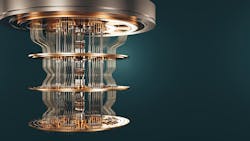Top Quantum Computing Trends in 2025: Enterprise Adoption, Hybrid AI, and Photonic Chip Breakthroughs
Key Takeaways
- Discover how hybrid quantum-classical AI could make manufacturing equipment smarter, faster, and more energy-efficient.
- Learn how enterprises can leverage neutral-atom quantum computing to solve complex business problems and accelerate innovation.
- See how hybrid quantum-classical algorithms are improving AI performance, reducing costs, and speeding learning cycles for companies.
- Understand how advances in photonic chips are setting new performance benchmarks for scalable, next-generation quantum computers.
Quantum computing continues to move from research labs into real-world applications, with 2025 shaping up as a year of major breakthroughs. From QuEra and Deloitte helping businesses harness neutral-atom quantum systems, to Spectral Capital's hybrid quantum-classical AI innovations, and Xanadu and HyperLight pushing photonic chip performance to new heights, these developments highlight how quantum technology is accelerating enterprise adoption, improving AI efficiency, and setting the stage for next-generation computing hardware.
Hybrid Quantum AI Could Transform How Manufacturing Equipment Learns and Adapts
WiMi Hologram Cloud, Inc. is exploring a new hybrid quantum-classical machine learning algorithm that could change how artificial intelligence systems are trained, potentially slashing energy consumption while speeding up performance. The process uses conventional machine learning to pre-train dense neural networks, then transitions to a sparse model optimized using quantum computing techniques. This shift reduces computational complexity and enables more efficient training of large-scale models.
While the technology is still in the research phase, it has big implications for the future of smart manufacturing. Quantum-enhanced AI could enable production equipment to learn from data far faster and more efficiently than traditional models allow. That could translate to faster deployment of vision-based defect detection, more responsive predictive maintenance algorithms, or highly adaptive process controls—all with lower energy demands. WiMi's framework also suggests a future where the computational heavy lifting for industrial AI could move from cloud-based data centers to smaller, more energy-conscious edge devices embedded in machinery. As quantum hardware and software mature, the integration of quantum AI into manufacturing equipment design, simulation, and control could become a key competitive differentiator.
Learn more
QuEra and Deloitte Team Up to Bring Neutral-Atom Quantum Computing to Enterprises
QuEra Computing and Deloitte are teaming up to make quantum computing easier for businesses to use neutral-atom quantum computing. By combining QuEra's advanced quantum hardware and software platforms with Deloitte's industry experience and technology expertise, the partnership will help companies in fields like life sciences, finance, and logistics to prototype and test quantum algorithms and eventually put them into practice. The goal is to help businesses solve complex problems faster and more efficiently than with traditional computers by unlocking new ways to optimize, simulate, and model complex data.
The collaboration includes helping companies get started with quantum projects, connecting them to existing systems, and training employees to use the technology—from prototype to production. Early work has already shown that quantum computing can do things classical computers struggle with, like predicting molecular properties for drug discovery. Together, QuEra and Deloitte aim to make quantum computing a practical tool that businesses can actually use to improve operations and drive growth.
Learn more
Spectral Capital Develops 100+ Hybrid Quantum-Classical Innovations to Boost AI Efficiency
Spectral Capital has announced the development of more than 100 new hybrid quantum-classical computing innovations in 2025, aimed at making AI models faster and more efficient for its portfolio companies. These innovations combine classical computers with quantum processors to handle complex calculations more quickly, helping businesses reduce costs and improve AI performance in areas like messaging, predictive analytics, and intelligent infrastructure.
Hybrid Quantum-Classical Algorithms distribute the workload between a classical and a quantum computer. Classical systems handle data preparation and optimization tasks, while quantum processors execute computationally demanding sub-routines. The systems operate in a feedback loop—where classical hardware refines parameters based on quantum outputs, and quantum systems accelerate resolution of critical subproblems.
This hybrid approach is at the core of emerging Quantum Machine Learning (QML) models. In these models, classical AI systems pre-process input data and use quantum subroutines to extract high-dimensional insights from complex datasets. The results are then integrated into the classical models, allowing for more accurate predictions and accelerated learning cycles.
Spectral Capital plans to continue expanding its technology portfolio and integrating these innovations into acquired companies, delivering measurable improvements in efficiency, scalability, and competitive advantage.
Learn more
Xanadu and HyperLight Achieve Breakthrough in Photonic Chips for Quantum Computing
Xanadu and HyperLight have announced a major advancement in photonic quantum computing, achieving ultra-low losses in thin-film lithium niobate (TFLN) photonic chips. The new chips feature waveguide losses below 2 dB/m and switch losses around 20 millidecibels, among the lowest ever reported for electro-optic switches in quantum applications. Produced in a high-volume semiconductor facility, these chips are designed to support the large-scale deployment of photonic quantum computers.
This breakthrough builds on Xanadu's previous success with the Aurora fiber-networked photonic quantum computer and demonstrates the potential of the TFLN Chiplet platform for next-generation quantum hardware. By combining Xanadu's photonic expertise with HyperLight's high-performance TFLN technology, the collaboration is setting new benchmarks for scalability and efficiency, bringing utility-scale quantum computing closer to reality.
Learn more
About the Author
Laura Davis
Editor-in-Chief, New Equipment Digest
Laura Davis is the editor in chief of New Equipment Digest (NED), a brand part of the Manufacturing Group at EndeavorB2B. NED covers all products, equipment, solutions, and technology related to the broad scope of manufacturing, from mops and buckets to robots and automation. Laura has been a manufacturing product writer for eight years, knowledgeable about the ins and outs of the industry, along with what readers are looking for when wanting to learn about the latest products on the market.
